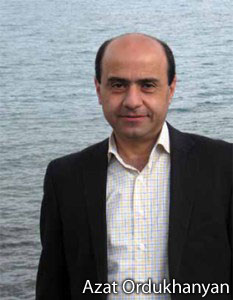Armenians Celebrate to Help Artsakh Victims

BOCHUM, Germany JULY 21, 2016— For Nathanial Ullmann, a journalist for the largest regional newspaper in Germany, the response of participants at a concert in Bochum on July 8 showed just “how different German and Armenian culture are.” He explained: “Whereas Germans at an elevated cultural event sit there in silent wonder, Armenians sing, dance and clap in happy enthusiasm.” And that is the case, even if the occasion might be a sad one.
This was a benefit concert in the Christ’s Church in Bochum-Linden, organized by the Armenian-German Association 1860, and the proceeds will go to the families of soldiers killed in the Artsakh war last April, as the organization’s head Azat Ordukhanyan said. Thus, a sad occasion, indeed; and yet, the mood was one of celebration. The ensemble “After Our Era,” which had traveled from Armenia for this concert and for a folk festival near Frankfurt, performed on traditional instruments – duduk, tar (sitar), cylinder drum and Armenian bagpipe — while Madlena Galstyan sang. Selecting from a repertoire that spans the centuries, the musicians (virtually all graduates of the Yerevan Conservatory) presented works by the 10th-century monk Gregor of Narek, other medieval composers and, from the modern era, Makar Yekmalyan and Komitas Vardapet.
“And we have good reason to celebrate,” said Heide Rieck, while introducing the performers to the hundreds of guests. Rieck, who is a leading figure in Bochum’s literary milieu, has been engaged in several Armenian initiatives over the past years. Cause for celebration, she said, was the German Bundestag’s recognition of the genocide on June 2 of this year. The music of Komitas, she said, who studied in Berlin and Paris, “has not been silenced and it has won out over the murderers, it lives on.”
The church was filled to capacity, as hundreds of Armenians from the Ruhr region had come, as well as several from as far away as Hamburg and Toulouse. Traffic jams had delayed the concert but once all had arrived, the musicians marched onto the elevated altar area to the sound of rolling drums and the shrill tones of a flute. The parishioners of this church feel a special relationship to Armenia and the fate of its people, for a historical reason: a nurse from Bochum-Linden who had served in the Second World War bequeathed her life’s savings – 50,000 deutsche marks — for the church to erect a statue on its premises, dedicated to the cause of peace. In 2005 a minister of the Christ’s Church traveled to Armenia, and in Gumri met sculptor Albert Vardanyan. The following year, his statue, “Pulsar — Ode to Peace,” was unveiled in front of the church. In his words of welcome, church representative Rudolf Skibinski Palmer highlighted this special relationship, and said that Armenia would figure as a theme next year in the context of festivities to celebrate the 500th anniversary of Martin Luther’s theses.
Then the music began, and as Rieck described it, “marvelous sounds rang out from a faraway world, first melancholic, then soon with wit and swing,” both so familiar to the Armenian soul; “and they let themselves be carried away, they clapped, they swayed in rhythm, and soon five young women (along with two little girls on the sidelines) could no longer sit still, and they danced, hips moving, arms raised and hands swirling – softly and yet strong, like wild flowers in the winds…”
When the concert concluded, the applause was enough to make the church walls shake. Ordukhanyan said it was a “unique feeling to hear Armenian songs in this setting.” But the evening was not over. Groups gathered to talk and enjoy refreshments, then one of the musicians sat down at the organ and began to play, a flute joined in and even a German musician on hand took up his instrument, a German-Armenian duduk duet rang out, to shouts of “long live the Armenian-German friendship.” It was midnight when the doors to the church finally closed. The journalist from the Westfaelische Allgemeine Zeitung summed up: “The Armenian people have not had an easy time of it in their history — but despite that, or perhaps because of that, they have never lost the joy of life.”

